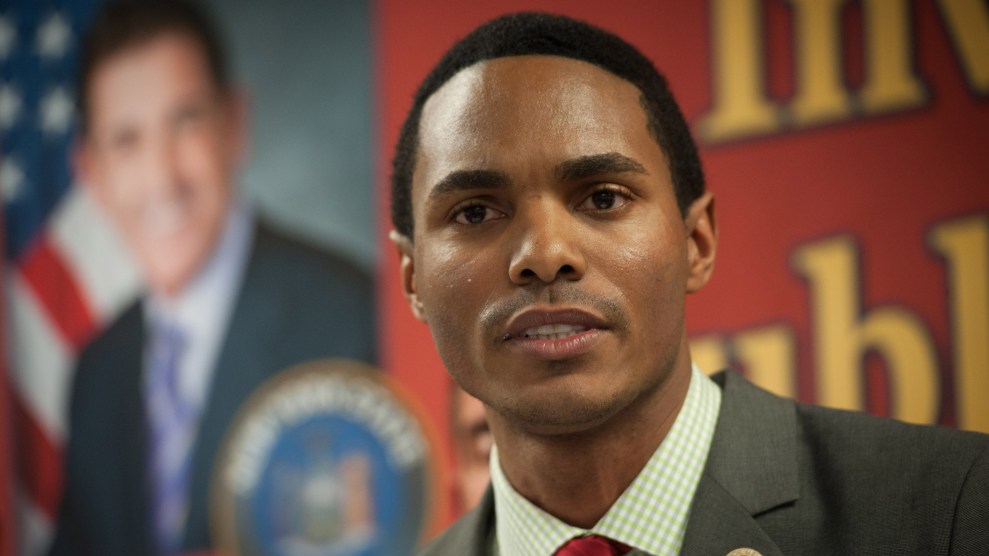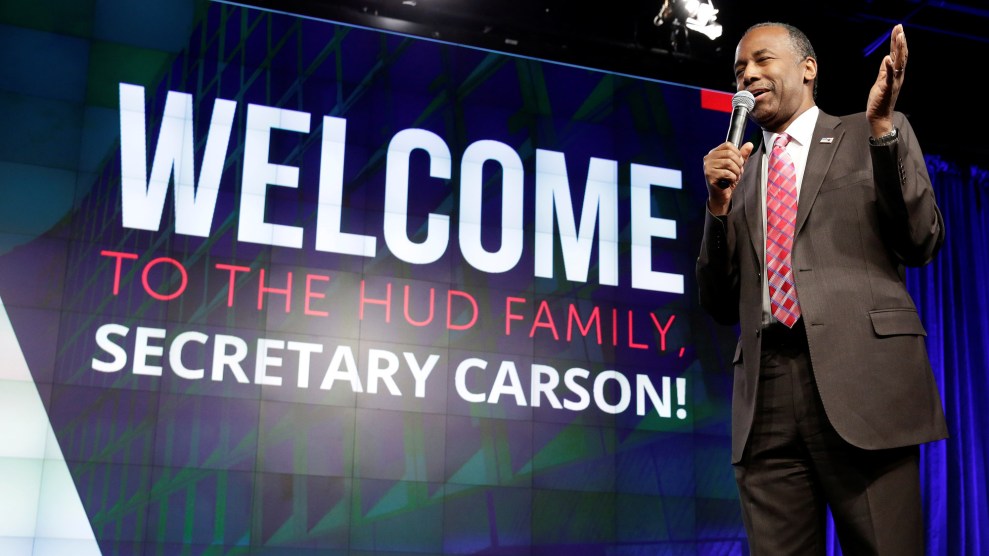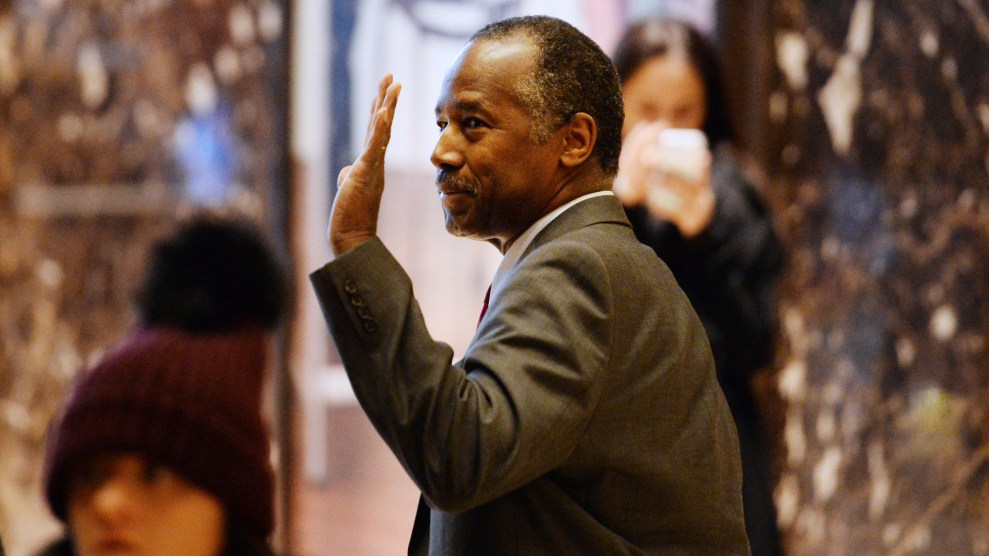
Bryan Smith/Zuma
Long before he became the youngest elected member of the New York City Council, Ritchie Torres grew up in Throggs Neck Houses, a public housing project erected across the street from the Trump Golf Links at Ferry Point in the East Bronx. While the golf course was under construction, the 29-year-old Torres recalls, a skunk infestation plagued the projects. “So those of us in the Throggs Neck Houses were smelling the stench of Donald Trump well before he became president,” he jokes.
Now, as a rising-star city council member representing the central Bronx, Torres serves as the chairman of New York City’s Committee on Public Housing, which oversees the nation’s largest public housing system. It’s from that vantage point that he’s watched the Trump administration propose steep cuts to the federal housing agency—cuts that advocates worry could lead to further backlogged repairs and leave thousands at risk of homelessness.
Weeks before the White House released its “skinny budget” proposal for the upcoming fiscal year, city officials were already bracing for huge reductions in federal housing assistance. Nearly 63 percent of the New York Housing Authority’s $3.2 billion operating budget comes from the federal Department of Housing and Urban Development. In February, HUD, which could see funding cuts of $6.2 billion under the president’s proposed budget, informed New York City’s housing agency that it could lose at least $75 million in funding. Torres and Judi Kende, vice president and New York market leader at Enterprise Community Partners, noted in an op-ed in Next City that if the federal budget measures were held in place, New York’s housing authority could see a $350 million loss by 2018.
What exactly does that mean for the most vulnerable New Yorkers? We spoke to Torres about the projected cuts—and what’s next.
Mother Jones: What went through your mind when you first heard about the cuts to HUD?
Ritchie Torres: If the president’s budget were to be enacted as presented, it would represent a calamity for New York City. We’re in the midst of an affordability crises, the likes of which we have not seen since the Great Depression. We have 60,000 individuals in our shelters, a third of whom are children; 80,000 students in our public school system who belong to households that have no permanent stable housing; and we have hundreds of thousands of people on the waiting list for Section 8 for public housing. There’s a real need for affordable housing, and the fact is, just about every tool that we employ to create affordable housing in New York City is federal in nature, whether it’s the low-income housing tax credit or Section 8. The mayor has an ambitious housing plan aimed at creating and preserving 200,000 units over the next 10 years. It’s $41 billion in total, and if Congress tomorrow were to dissolve the low-income housing tax credit, his whole housing plan collapses. That speaks to the depth of New York City’s dependency on the federal government.
And more specifically on the cuts: The largest source of affordable housing for the poorest New Yorkers are public housing and Section 8. And [Trump’s] program would starve public housing of hundreds of millions of dollars in federal funding, even though the New York City Housing Authority has been systematically starved for the past few decades. It’s been so woefully underfunded by the federal government that it cannot afford to absorb the shock of funding losses on the scale that Donald Trump is proposing. And Community Development Block Grant (CDBG) funding is one of the most flexible sources of funding for localities. So there are programs that appear to be local in nature that are primarily funded by the federal government. One example in New York City is our housing code enforcement system. We have the finest system of housing code enforcement in the country, so when the tenant has a complaint about a condition in his or her apartment, you can call 311 and within a matter of days, the Department of Housing Preservation and Development can send inspectors to hold landlords accountable for repairing conditions. Eighty percent of the funding for housing code enforcement in New York City is CDBG funds. Our capacity to create affordable housing, preserve affordable housing, and to ensure housing maintenance and quality would atrophy and collapse.
MJ: HUD notified the New York Housing Authority that it would lose $75 million before the budget blueprint dropped. How would the loss affect NYCHA’s ability to function?
RT: NYCHA faces funding threats on two ends. One is from Congress, but then the Trump administration has the ability to slash funding for public housing and Section 8 without congressional action. Funding for public housing and Section 8 are based on a formula, and you can tinker with the formula to generate less funding for public housing. So simple changes in the formula have led to $75 million worth of losses. It might seem like a marginal reduction, but it has a crippling impact on an agency that has been chronically underfunded. The loss of $10 million is the equivalent of 100 caretakers. And keep in mind: NYCHA has been plagued by decades of disinvestment. It has a backlog of $17 billion worth of capital needs. The head count of the housing authority has fallen by 2,000 employees. There’s no room for revenues from efficiencies. These cuts cannot be absorbed without a savage reduction in the living conditions of public housing residents.
MJ: What are you telling your constituents and members of your district?
RT: The reality is, I represent some of the poorest residents in the city, in the country, who feel abandoned and failed by the whole political establishment—Democrats, Republicans. Public housing has been failed at every level by every party. And so it’s tempting for them to believe that we are in our darkest moment. What I try to explain to my constituents is that it could get much worse. For all the challenges you face in public housing, it can get dramatically worse. These cuts will mean that you will have to wait years for basic improvements and repairs into your apartment. You will experience gas outages more frequently. Boiler breakdowns, elevator breakdowns, more frequently. Fewer caretakers maintaining your properties on the front lines. You will feel the impact of these budget cuts. It’s hardly an abstraction.
MJ: What about your mother, who lives in public housing herself?
RT: I think she’s anxious about what Donald Trump means for public housing. I tell my mother that I’m going to work my heart out to champion the cause of public housing residents and to resist Donald Trump, but the odds are steep. It’s going to be an uphill battle. Donald Trump’s assault of the social safety net is so all-encompassing that, what do you prioritize? We’re facing attacks on every front. My focus has been affordable housing in general and public housing in particular. I believe that in New York City, the central emotion in our time is anxiety about displacement—displacement from one’s home, displacement from one’s neighborhood. And federal investment in cities and in affordable housing is critical to addressing those anxieties about displacement. So that’s where my focus will lie.
MJ: How do you think the city has responded to these projected cuts and its impact on public housing?
RT: To be blunt, ineffectively. We should do more. I feel like we have to expand our vision for what it means to govern. There needs to be more partnerships between activists on the ground and those of us in elected office. We need to invest more resources in political organizing and then political agitation. We are in uncharted territory. Everything that we care about is at stake. We should push the traditional boundaries of local government. We should be investing in those resources. We’re not going to defeat Donald Trump and resist him by playing nice, by playing by the conventional rules. It’s also asymmetric warfare. There are congresspeople who are aiding and abetting Donald Trump’s assault on the social safety net, and we should be organizing residents in public housing, residents in NYC in general, to hold those elected officials accountable, to exert extraordinary pressure on them, to make it known that there are political consequences to abandoning the best interest of New York City.
MJ: This isn’t theoretical for you—you grew up in public housing.
RT: Yeah, I grew up at the Throggs Neck Houses, right across the street from the Trump golf course. When you live in public housing, just like those who live in the private housing market are anxious about gentrification, those living in public housing tend to be anxious about privatization. And there was a rumor spreading that Donald Trump had bought public housing. There’s a sense that he is now the owner of public housing by virtue of being president. So our worst nightmares have come true. Public housing felt far more secured when I was growing up than it does now. Now it feels more like an endangered species, an endangered institution. I said at the last public housing hearing that the Trump presidency represents the gravest threat to public housing in the 82-year history of the New York City Housing Authority. And I meant it.
MJ: A recent New Yorker profile of you noted that you were troubled by the idea of Ben Carson taking over as HUD secretary. Why did you feel that way then? How do you feel about it now that he’s in office?
RT: As far as I can tell, he has no deep knowledge of housing policy and he seems to indiscriminately caricature every housing program as social engineering or government dependency. I think he fails to appreciate the role of affordable housing plays in preventing homelessness and stabilizing lives and providing a foundation for achieving the American Dream. Instead of defending the social safety net, he seems to have contempt for it. And there’s an irony here: You would think that as a doctor, he would fully understand the connection between health and housing. And he’s sensitive to mold and the impact that it has on those living in public housing. But by disinvesting from public housing, by disinvesting from roofs and bricks and the core infrastructure of public housing, he’s simply creating more mold and more public health hazards, not fewer. So the irony is that a doctor who is at the helm of HUD is creating a public health crisis in public housing.
Correction: The article previously misstated Torres’ age.
















